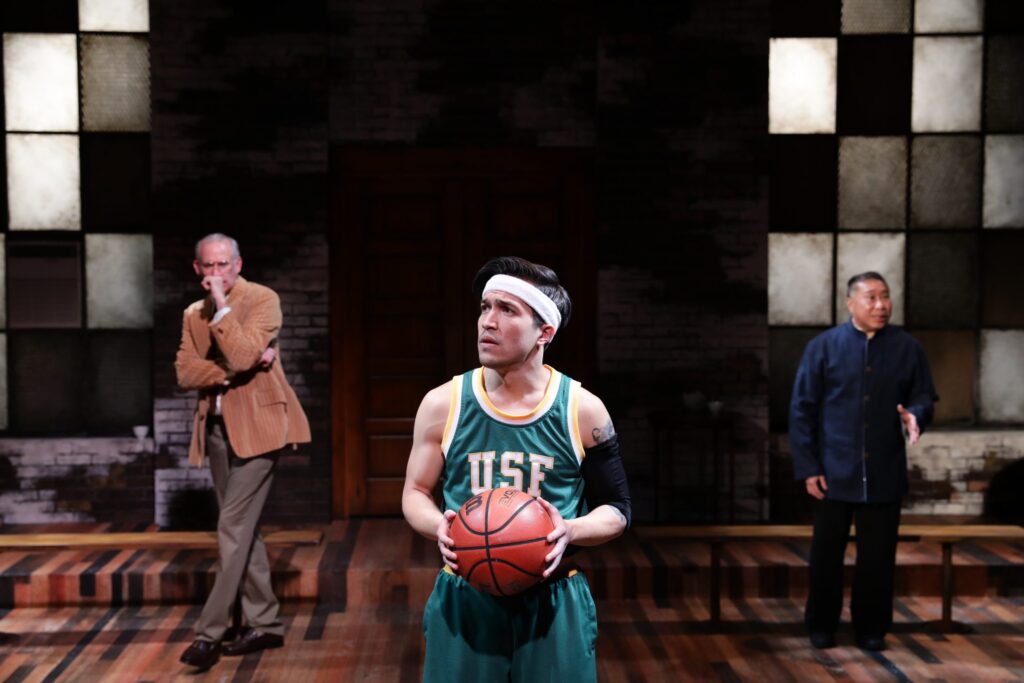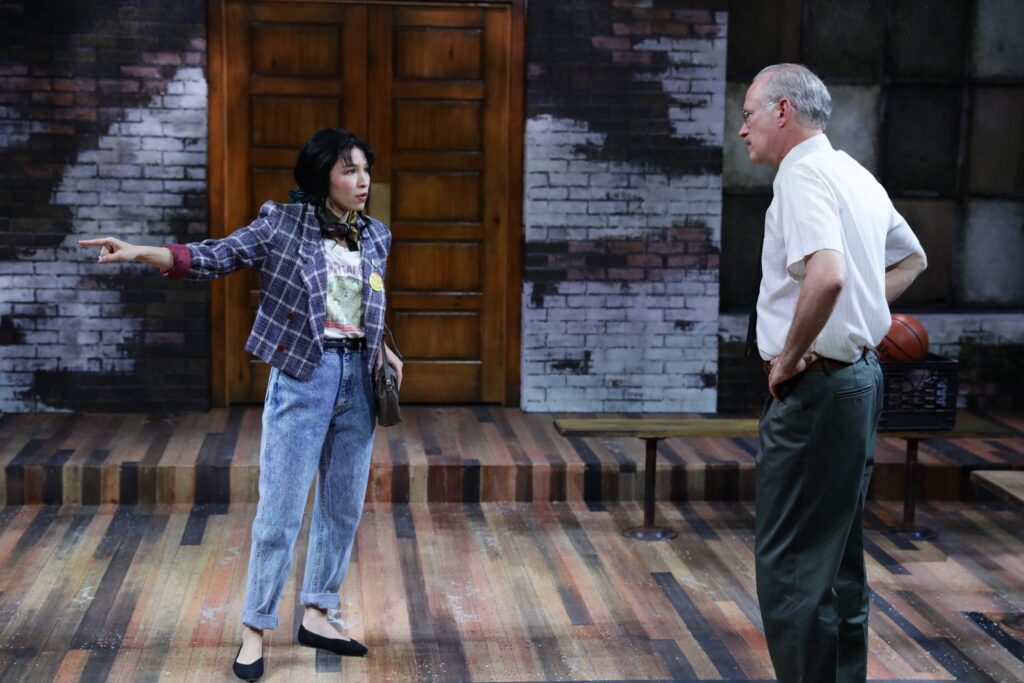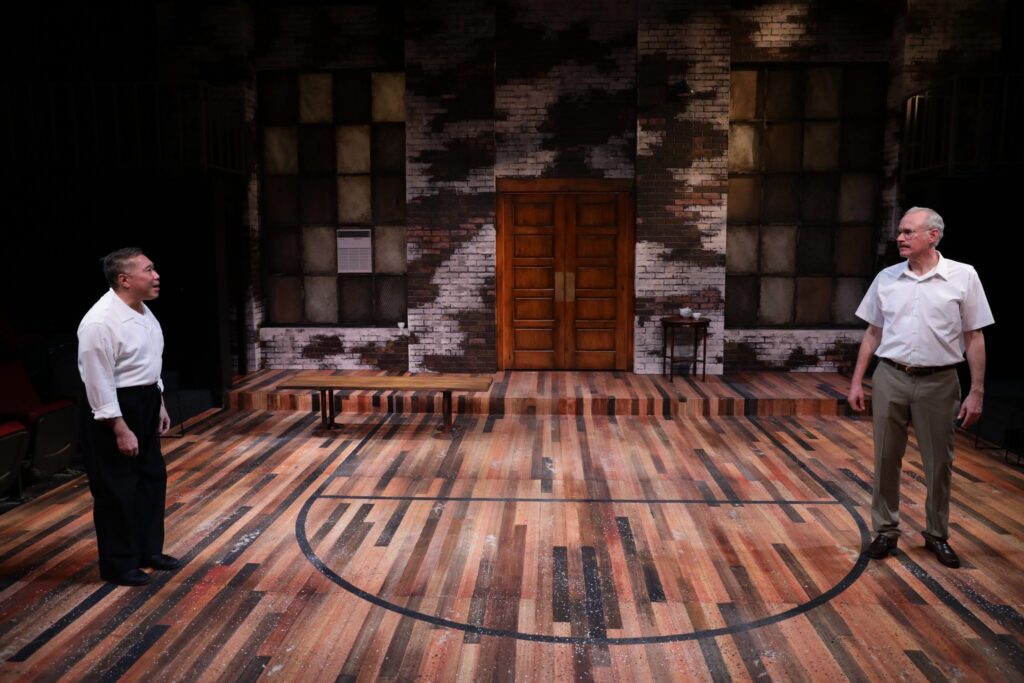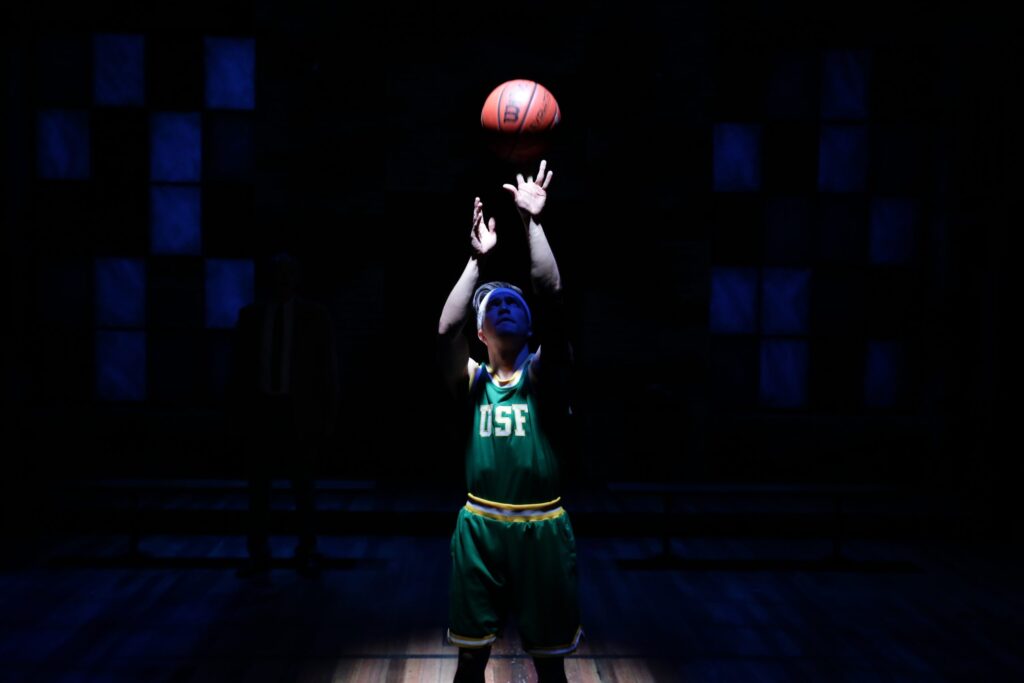
The Great Leap – Written by Lauren Yee. Directed by Michael Hisamoto. Scenic Design by Baron E. Pugh. Costume Design by Seth Bodie. Lighting Design by Michael Clark Wonson. Sound Design by Elizabeth Cahill. Presented by Lyric Stage Company of Boston through March 19, 2023.
by Linda Chin
Boston Lyric Stage’s current production of The Great Leap by award-winning playwright Lauren Yee – now making its Boston premiere – elegantly explores and brilliantly blends the complicated worlds of basketball and US-China politics.
Full of twists and turns – not unlike the game of basketball and US-China relations, The Great Leap draws you in from the top of the show and holds your interest through its intense, suspenseful, nail-biting final quarter, which takes place in Beijing. Set in San Francisco in 1989, the play opens with Manford Lum, an impulsive, determined, American-born Chinese teenage street baller (an earnest and expressive Tyler Simahk), barging onto the turf of the coach of the University of San Francisco’s Division I basketball team with a big ask. Saul, the feisty, Bronx-born, Jewish coach (played by versatile stage veteran Barlow Adamson) has been invited (read: “challenged”) to a “Friendship Game” in China. Manford is desperate to go to Beijing and play in the game.

Manford tries to convince Saul to take a chance on him: even though he is but 5’7”, he’s a great point guard, a phenom on the Chinatown courts (who practices by sinking 100 baskets each night before bed), and though he’s in high school and a minor, he is college-bound (with an “aspirational name” that alludes to the Bay Area university), and has abundant family support to sign the requisite permission slips (his mom’s from China).
Unbeknownst to Saul, some of these persuasive pleas are stretches from the truth. Not only is Manford an academic giant, he’s often bullied by his peers and has skipped school a lot. When his busy (single) mother wasn’t working at one of her several manual labor jobs, they spent time at home watching Warrior games. They hardly talked or knew each other; he mostly shoots the breeze and confides in his college-educated, older “cousin” Connie (an empathetic and eloquent Jihan Haddad). Manford doesn’t reveal that he is newly orphaned; in fact, he rushed to USF straight from his mother’s funeral. An article about the upcoming “Friendship Game” ran in the same edition of the local newspaper as his mom’s obituary. Accompanying the article was an archival photograph, circa 1971 – a pair of American and Chinese coaches shaking hands. The American coach was Saul.

Filling out the four-character play is Wen Chang, the Chinese coach in the photograph and now the Beijing University basketball coach, who invites his American counterpart to the 1989 “Friendship Game” Unbeknownst to Manford, the younger, not yet washed-up Saul was invited by the Chinese government to teach them American-style basketball (“every time you’re on that court, it is always your turn”), and Wen Chang was assigned as Saul’s language (and cultural) interpreter. They became friends but lost touch. During this visit, they are rivals – each determined to win the game for career security.
Gary Thomas Ng portrays the rehabilitated product of the Cultural Revolution and loyal party member to perfection. His position requires (and his life literally depends on) him being an active listener and astute observer; his speech (and body language) is guarded. In the many asides that pepper the dialogue, the audience is treated to Wen Chang’s unfiltered emotions, dreams, and humor. It is worth noting that Wen Chang does not speak English with a “cringy” caricatured accent typical of most Asian characters in American popular culture. One of the play’s funniest bits is when Wen Chang points out that the fast-talking, foul-mouthed Saul speaks very improper English for an American.

But Barlow Anderson’s portrayal of Saul is a bit too bombastic, and his outfit a surprisingly bold choice for an American to make on an official visit to China in 1971. I also felt Connie’s outfit (a miniskirt – at a funeral no less) was far less conservative than a young Chinese-American woman with a traditional upbringing would wear in 1989.
As a takeoff on the Levy’s Rye Bread ad campaign of my childhood (which the Bronx-born Saul would surely remember), you don’t have to be Jewish, Asian (or Asian-American), or even a basketball fan to love this play. With playwright Lauren Yee’s thorough research, respect for authentic storytelling and representation, hilarious and heartfelt writing, Michael Hisamoto’s deft direction, and a winning cast, don’t throw away your shot – see Lauren Yee’s The Great Leap at Lyric Stage before it closes on March 19th. For tickets and information, go to: www.lyricstage.com

